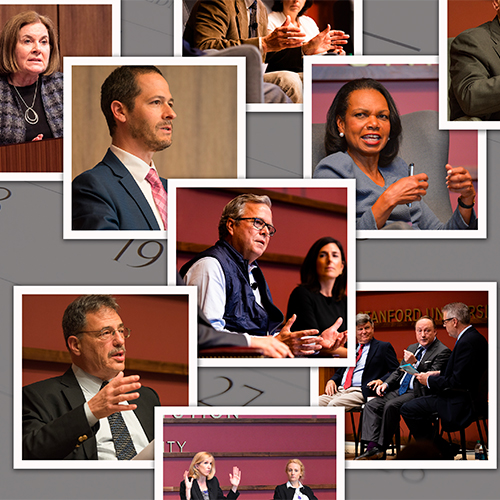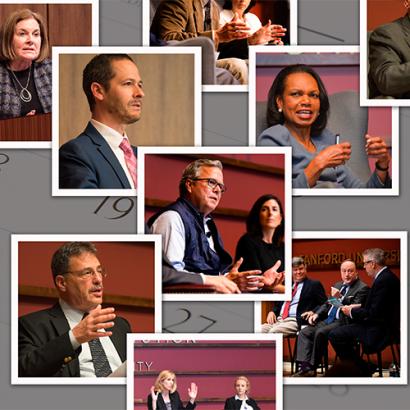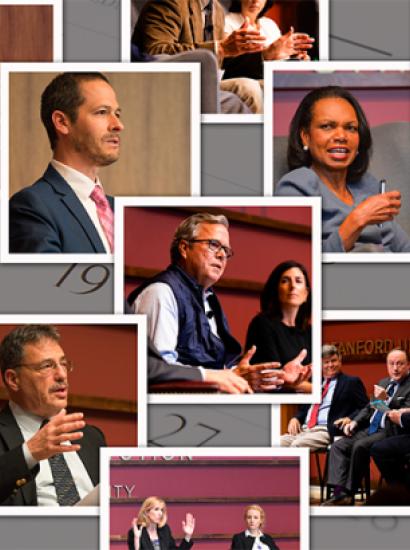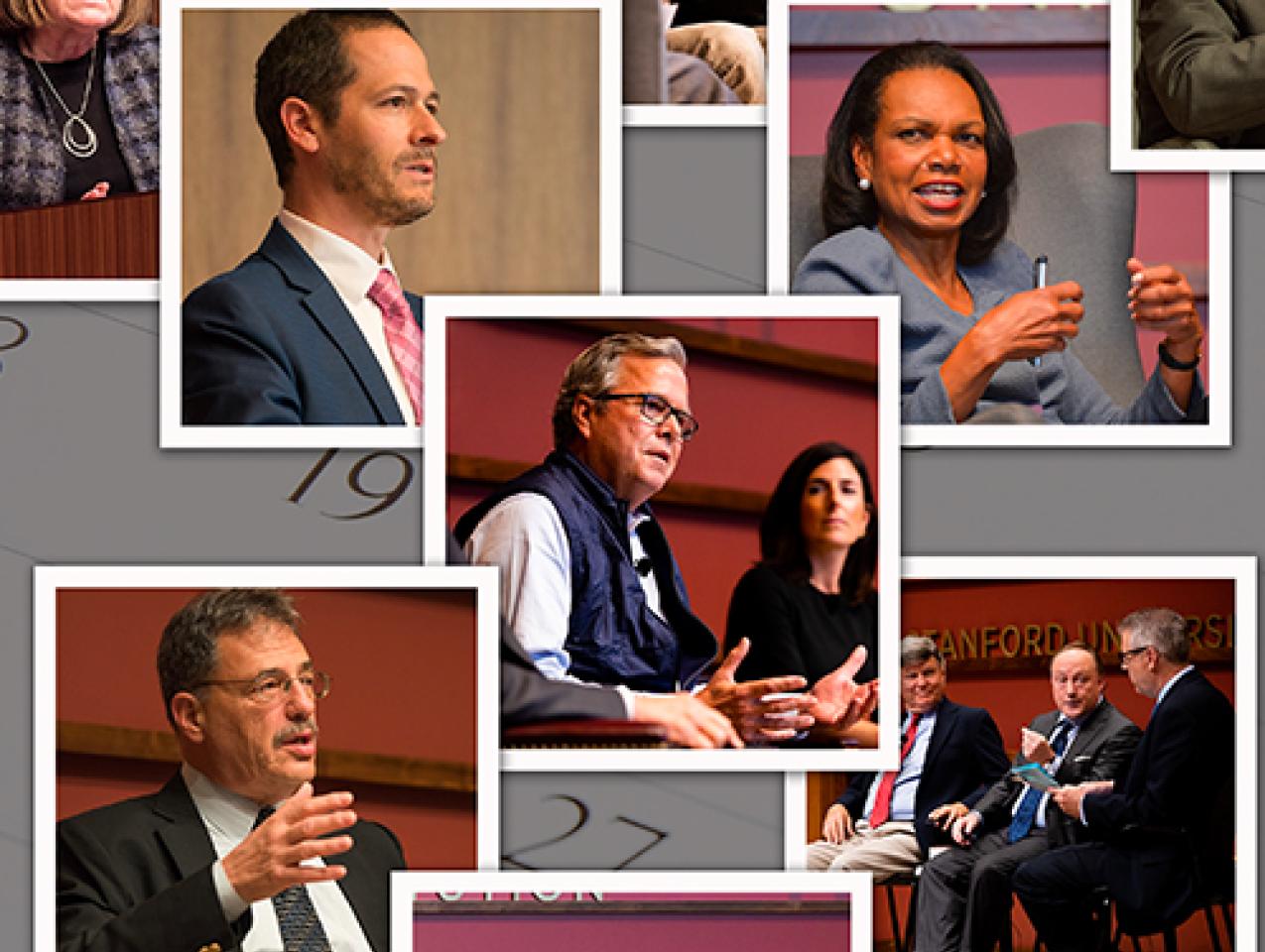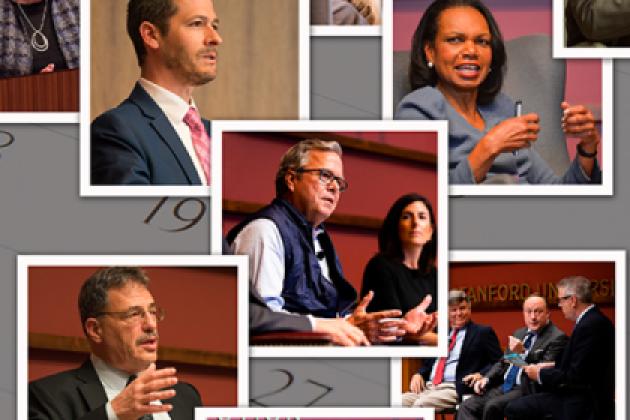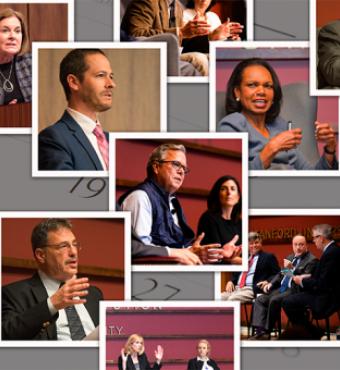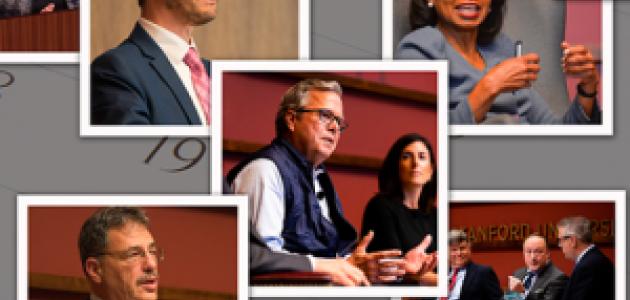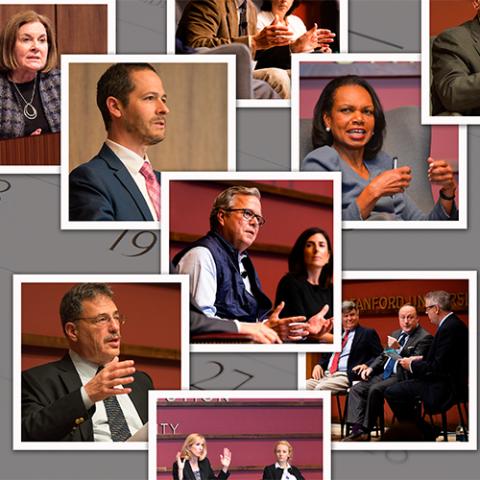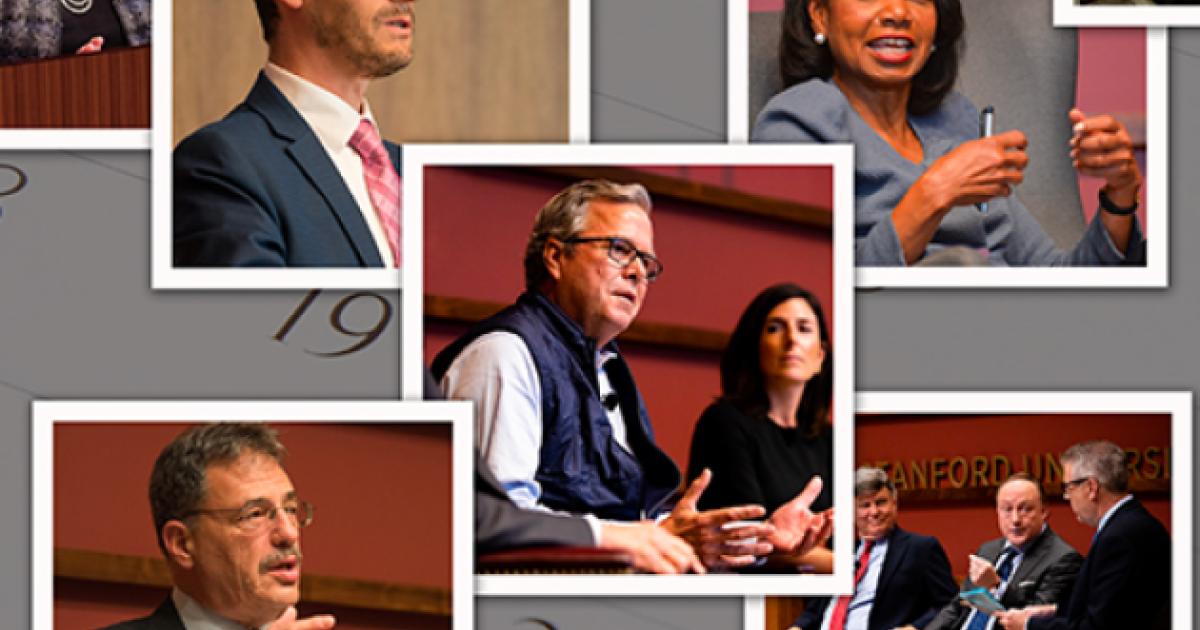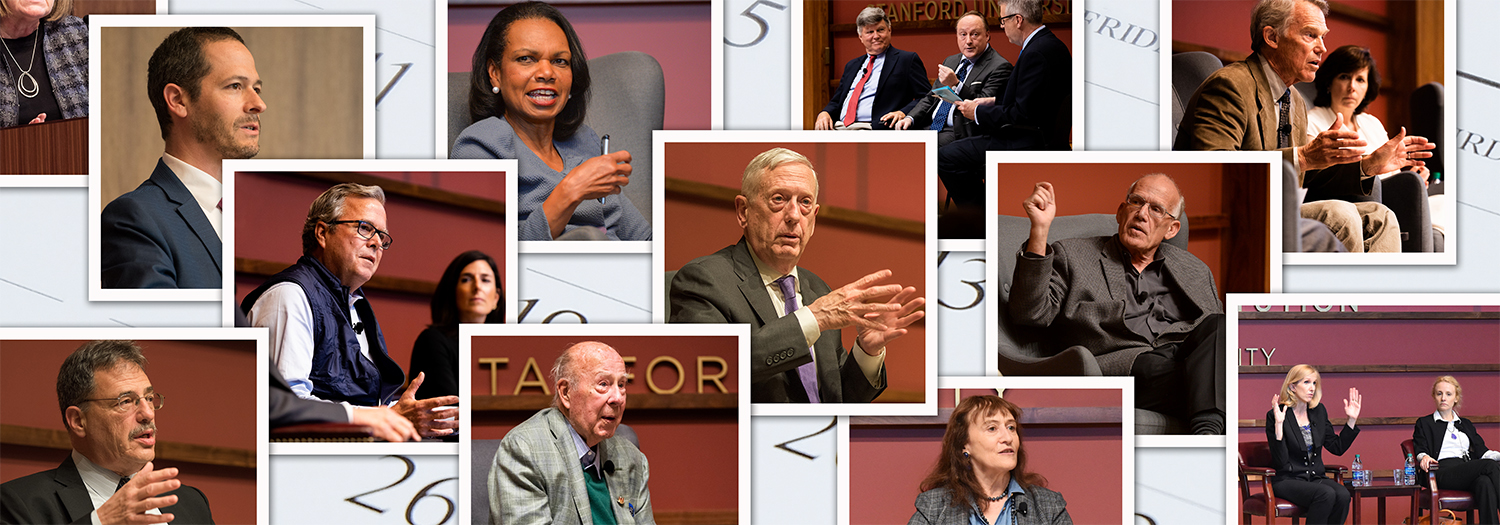
In 2019, the Hoover Institution celebrated its centennial with a special lecture series and many other events that showcased the breadth and depth of our fellows’ scholarship. Hoover fellows discussed policy avenues for an emerging new world with a wide range of topics, policy ideas, and guests including former Secretary of Defense James Mattis, former Secretaries of State Condoleezza Rice and George Shultz, former National Security Advisor H.R. McMaster, and many more scholars, authors, military and policy leaders. Here is the centennial lecture series, the governance series, and a selection of other events in reverse chronological order.
Centennial Lecture Series
LABOR AND CAPITAL MARKET POLICY: FROM IDEAS TO ACTIONS OVER ONE HUNDRED YEARS
Tuesday, November 19, 2019
Nowhere are good economic ideas more important for growth and stability than in labor and capital markets. Enormous technological, political, and demographic shifts in the past one hundred years have changed what is feasible and what works in practice. Panelists will discuss how ideas about the roles of government and private enterprise have changed, how good ideas stressing economic freedom can be advanced into action, and the influence of globalization on the ability of governments to apply good ideas to capital flows and immigration.
HOOVER’S ONE HUNDRED YEARS OF WAR, REVOLUTION, AND PEACE
Monday, November 4, 2019
Historians Niall Ferguson and Victor Davis Hanson discussed the seminal events of the last century—the two World Wars, the Great Depression, the rise and fall of Soviet communism, and the advent of modernism and globalization—and how Hoover Institution scholars, informed by the lessons of history, have interpreted these tragedies and challenges.
TAX AND MONETARY REFORM: FROM IDEAS TO ACTIONS OVER ONE HUNDRED YEARS
Wednesday, October 2, 2019
Hoover Institution economists have generated many ideas on tax reform and monetary reform over the years, from the Friedman Rule and government spending limits to the Hall-Rabushka Flat Tax and the Taylor Rule. Panelists will discuss the origination of such ideas, how they have been applied in practice in the United States and other countries, and the future of such reform-oriented policy.
New Regional Orders And New Ways Of War: Europe, The Middle East, And Asia
Tuesday, September 24, 2019
The global order of the past seven decades is being disrupted by regional dynamics. Powers of the past are reasserting themselves—Russia in Europe and the Middle East, Turkey and Iran in the Middle East, and China in Asia and beyond. Technology is changing how nations can prosper, influence, and compel. The panel will discuss what these changes portend for each of these regions and the US role in shaping events in its national interest.
Tuesday, August 20, 2019
Hoover scholars have been heavily involved in far-reaching educational research, and their work provides surprisingly positive answers to thorny questions, such as whether scholarship has ever influenced the debate on educational policy; whether new policies are just about politics without regard to fact; and how to mitigate bad ideas by introducing good ideas through research and analysis.
THE BIG THREE: ROOSEVELT, STALIN, AND CHURCHILL DURING THE SECOND WORLD WAR
Thursday, July 18, 2019
During the Second World War, President Franklin Roosevelt, Premier Joseph Stalin, and Prime Minister Winston Churchill exchanged hundreds of cables and held two summit meetings, coordinating the vast allied effort to defeat Nazi Germany and Imperial Japan. Panelists will discuss why the peaceful new international order that the three agreed to establish after the conflict turned instead into the Cold War.
BATTLEGROUND OF PERCEPTION: COUNTERING THREATS TO FREE AND OPEN SOCIETIES
Tuesday, June 4, 2019
Repression and authoritarianism are not merely phenomena of the historical past. Today, we are engaged in a fundamental battle of free and open societies against repressive, closed systems. This panel will address the nature of such threats and discuss the identities of freedom’s adversaries, their goals and strategies, and what can be done to defeat these threats across government, the private sector, academia, and civil society.
TECHNOLOGY, INNOVATION, AND THE FUTURE OF THE US ECONOMY
Monday, May 20, 2019
This session discussed the historical sources of prosperity in the United States and will look at the drivers of prosperity over the next century. Panelists will also address the ongoing debate about the impact of artificial intelligence and robotics on standards of living and the relevant facts and data to consider.
A CENTURY OF PROSPERITY: A REVIEW OF THE STANDARD OF LIVING, 1919 VS. 2019
Thursday, April 18, 2019
The past century has witnessed dramatic improvements in the standard of living in the United States. Panelists will discuss the role that free markets, property rights, innovation, regulation, and national security have played in this remarkable advancement in human well-being.
ONE HUNDRED YEARS OF DEMOCRACY AND FOREIGN POLICY
Thursday, March 26, 2019
The United States was founded on the principles of life, liberty, and the pursuit of happiness, and for decades, support for democracy around the world has been a central tenet of American foreign policy. The past century provides many examples of prosperity in thriving democracies balanced with the instability of authoritarian and repressive regimes. This panel discussion examines the changing role of democracy building in America’s foreign policy over the past century.
Governance In An Emerging New World Series
EMERGING TECHNOLOGY AND NUCLEAR NON-PROLIFERATION
Tuesday, November 5, 2019
The existential threat posed by nuclear weapons is unique, and states have continuously managed that risk across decades of profound global change. How might changing global demographics and emerging 21st-century technologies redefine the nature of nuclear weapons proliferation and their use? Leaders from the Nuclear Threat Initiative will explore potential impacts on nuclear proliferation challenges and on counter-proliferation strategies, and panelists will consider the particular risks in the India-Pakistan nuclear standoff.
GOVERNING IN AN EMERGING NEW WORLD
Monday, October 7, 2019
Many have questioned the impact of new communication technologies on elections, but after the election, one must still govern. And taking advantage of the opportunities afforded by an emerging new world heightens the importance of good US political leadership. But the expanding use of social media and the advent of artificial intelligence and other new technologies are making day-to-day governance even more complicated. Drawing from their experiences in government, journalism, and policy, the panelists will discuss how these social and political dynamics have changed how governments operate and how these new tools can be harnessed to improve the quality of governance in America.
STABILITY IN AN AGE OF DISRUPTION
Tuesday, May 14, 2019
Communications technologies, demographics and the movement of peoples, and climate change are combining to place enormous pressure on democracies and the rule of law, both here in the United States and around the world. The panelists will discuss the impact of these disruptive forces on democratic systems, what can be done to strengthen governance, and how we might learn from when technological and social changes have challenged the capacity of democratic governments in the past.
EMERGING TECHNOLOGY AND THE U.S. ECONOMY
Monday, May 6, 2019
Artificial intelligence, advanced manufacturing, and other new technologies appear poised to transform the world economy, and, though the transition may be painful, the United States is well-positioned to take advantage of these new opportunities. Panelists will discuss the impact of changing demographics and advancing technology on the U.S. economy and what the United States can do to manage these changes and seize their potential, including improving the educational system, removing bias in AI, and ensuring a growing, productive population.
THE MIDDLE EAST IN AN EMERGING WORLD
Monday, April 22, 2019
Political upheaval, violence, and the Sunni-Shia divide have defined the Middle East and North Africa to outside observers for many years, but states across the region also confront shared global challenges of demographic transitions and governance in the age of social media, as well as the compelling economic potential of new technologies. The discussion will address what these profound undercurrents, as well as the changing climate and expanding role of women, mean for the major Arab states, Turkey, Iran, and Israel.
HEALTH AND THE CHANGING ENVIRONMENT
Monday, April 8, 2019
The changing environment is introducing new health risks and challenges alongside an increasingly interconnected world. Extreme weather events and warming climates encourage infectious diseases and pandemics to spread, while potentially disrupting ecosystem services and "supply chains" that today's economies rely upon. Panelists will discuss the health and social consequences of climate change and how new technologies enable us to mitigate their effects.
EMERGING TECHNOLOGY AND AMERICA’S NATIONAL SECURITY
Monday, February 25, 2019
The United States finds itself in strategic competition with China and Russia at the same time as its traditional technological superiority faces emergent challenges. The participants addressed how new military technologies might change the strategic dynamic in both Europe and in the Pacific and what these weapons may mean for non-state actors.
GOVERNANCE IN AN EMERGING NEW WORLD: Europe
Monday, February 4, 2019
The Europe of the early 21st century is rapidly changing, as European institutions evolve, populations age, and new political forces emerge. The panelists review how internet and communications technologies, new means of production, and rapid flows of people are affecting governance across the continent.
GOVERNANCE IN AN EMERGING NEW WORLD: AFRICA
Monday, January 14, 2019
Africa will be home to much of world’s population growth in coming decades, giving it a young, growing, and increasingly urbanized population. At the same time, it faces economic challenges and will acutely feel the effects of a changing climate. The discussion will explore what these demographic and environmental dynamics, alongside the promise of advancing technologies and new means of communications, will mean for governance and development across the continent.
Other Events
CALL SIGN CHAOS: A TALK WITH GENERAL JIM MATTIS
Thursday, November 14, 2019
The Hoover Institution hosts a discussion with General Jim Mattis on his new book Call Sign Chaos: Learning to Lead.
CYBER AND ARTIFICIAL INTELLIGENCE BOOT CAMP
Monday August 26, 2019 to Thursday, August 29, 2019
Threats in cyberspace, innovations in emerging technology, complex digital interdependence and challenges for security, governance, privacy and safety capture headlines across the globe each day. Nations, companies and individuals are increasingly dependent on information and information technology for societal functions. Ensuring the security of information and information technology — cybersecurity — against a broad spectrum of hackers, criminals, terrorists, propagandists and state actors is a critical task for the nation. Cybersecurity and emerging technology challenges are evolving rapidly, with threats facing the nation changing by the day.
THE FOUAD AJAMI FELLOWSHIP ANNUAL LECTURE WITH SPEAKER STEVE HADLEY
Wednesday, June 26, 2019
A conversation with former National Security Advisor Stephen Hadley on Global Foreign Policy Challenges and Opportunities for The Middle East, moderated by Elise Labott, Foreign Affairs Journalist.
EDUCATION 20/20 SPEAKER SERIES: WILLIAM BENNETT
Thursday, June 13, 2019
The Education 20/20 speaker series continued on June 13 as we brought you another major thinker about American education: William J. Bennett, U.S. Secretary of Education and Chairman of the National Endowment for the Humanities under President Ronald Reagan, and later director of the Office of National Drug Control Policy.
THE LEGACY OF TIANANMEN SQUARE AT 30
Thursday, June 6, 2019
A conversation with former National Security Advisor Stephen Hadley on Global Foreign Policy Challenges and Opportunities for The Middle East, moderated by Elise Labott, Foreign Affairs Journalist.
HOW TO FIX CONGRESS—AND WHY: A CONVERSATION WITH REP. MIKE GALLAGHER
Wednesday, June 5, 2019
The Constitution's authors expected Congress to be the first branch of our federal government. But today it serves less as a deliberative body legislating on matters of national importance, and more as ombudsman for the administrative state-a platform for cable television appearances.
THE FINANCE OF INFRASTRUCTURE SYMPOSIUM
Friday, May 17, 2019
It is widely understood that there is an infrastructure "gap" between planned and desired infrastructure; but actual investment in infrastructure is rife with challenges. This one-day symposium will aim to understand and discuss the obstacles that exist to the financing of infrastructure, and to discuss policy conclusions given these obstacles.
STRATEGIES FOR MONETARY POLICY: A POLICY CONFERENCE
Friday, May 3, 2019
Two related questions are central to an evaluation the Fed’s monetary policy strategy. First, how robust is the strategy? Second, can the strategy be improved by altering the degree of data dependence, by reconsidering monetary tools or instruments, or by changing communications about the strategy? The aim of this policy conference is to present relevant research developments and debate these and other crucial policy questions. The conference is meant to be complementary to other reviews of monetary policy this year.
Thursday, May 2, 2019
Once the darlings of Washington, Silicon Valley giants such as Google, Facebook, and Amazon are facing tough bipartisan scrutiny. As Congress debates the "Save the Internet Act," which would restore the FCC's Net Neutrality regulations for Internet Service Providers, many believe that the state of the Internet has fundamentally shifted since 2015 and that more focus should be applied to dominant tech platforms and their effects on privacy, small businesses, innovation, competition and our democratic discourse.
HAVE WE CLOSED SOCIOECONOMIC ACHIEVEMENT GAPS?
Tuesday, April 9, 2019
A new study released by Education Next uses nearly 50 years of student performance data in math, reading, and science to examine whether socioeconomic achievement gaps have widened, narrowed, or persisted. Join us for an event to discuss the findings with the report authors and a panel of experts.
EDUCATION 20/20: WILLIAM DAMON & ROBERT P. GEORGE
Tuesday, March 26, 2019
The provocative Fordham-Hoover “Education 20/20” speaker series resumeed on March 26th with another star-studded duo.
THE CASE FOR TRUMP: BOOK DISCUSSION WITH VICTOR DAVIS HANSON
Thursday, March 7, 2019
In The Case for Trump, award-winning historian and political commentator Victor Davis Hanson explains how a celebrity businessman with no political or military experience triumphed over sixteen well-qualified Republican rivals, a Democrat with a quarter-billion-dollar war chest, and a hostile media and Washington establishment to become president of the United States -- and, after two years in office, an extremely successful president.
CHINA'S INFLUENCE & AMERICAN INTERESTS: PROMOTING CONSTRUCTIVE VIGILANCE
Thursday, February 14, 2019
While Americans are well acquainted with China’s quest for influence through diplomatic, economic, and military power, we are less aware of the myriad ways in which Beijing has been seeking cultural and informational influence, some of which could undermine our democratic processes. These include efforts to penetrate and sway—through various methods that former Australian prime minister Malcolm Turnbull summarized as “covert, coercive, or corrupting”—a range of groups and institutions, including the Chinese American community, Chinese students in the United States, and American civil society organizations, academic institutions, think tanks, and media organizations. In this panel discussion, several of the report’s authors will present some of its key findings and answer questions from the audience.







